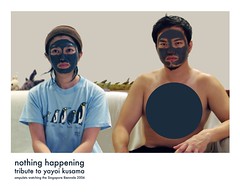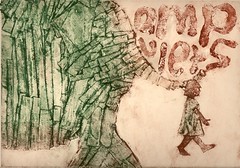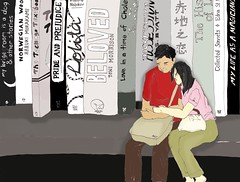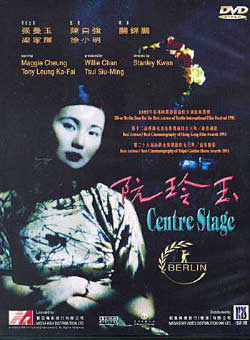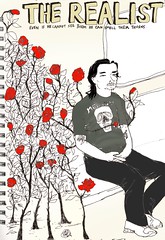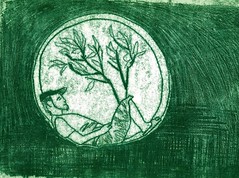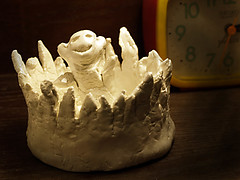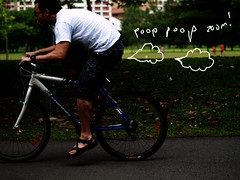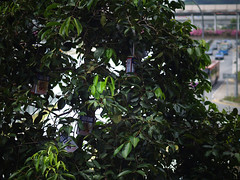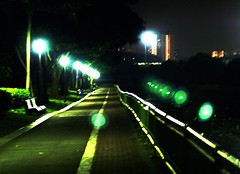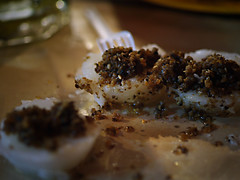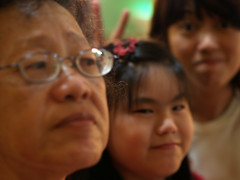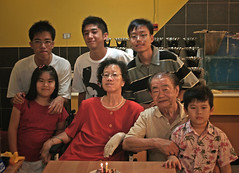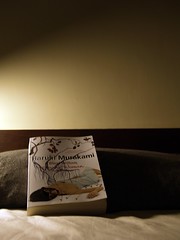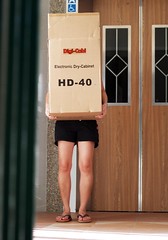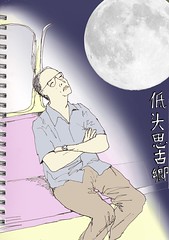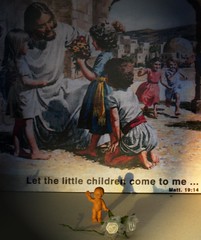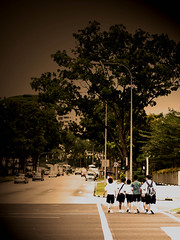 To school and back - image by J
To school and back - image by JBesides learning
how not to make a pretty picture, I learned that:
(1) Everyone likes feeling like an artistThere are 8 of us in the printmaking class: 3 designer-types, 1 teacher, and 3 others whom I haven't gotten round to asking about their daytime job.
One of my favourite classmates is Earnest. That's not his real name, of course. E is one of those young guys you think of as being 50. He wears oval gold-rimmed glasses, his grey polo T-shirt is loose over his skinny frame and tapered faded jeans, and he speaks a Mandarin-accented Singlish. E makes all of us in class smile and, sometimes, laugh with his nervous earnestness.
In the beginning, E would turn up for class often not knowing what to draw or produce on a print. He would laugh ashamedly, "don't know what to draw leh. No inspiration." And even after he has set pencil to paper, he would ask nervously, "teacher, how ah? I draw like this can or not?" (He was the only one in class who called N, our young artist- teacher "teacher"). When told by N that we would need to hand in assignments that would be graded, he grew even more nervous about his splotchy prints (well, we all made splotchy prints!) and would ask loudly - "er, teacher, how ah, this one can pass or not? Aiyah, sure fail one lah. If fail, then how ah?"
After almost 2 months, E remains just as earnest, but more confident.
"So how do you find the class now?" N the teacher asked E one day just as he settled down by his workspace. "Better? Are you enjoying it or not?"
"Better, better," he smiled and declared loudly, "yah, now, actually I like coming here every week. It's very good. Every week come here, can be very creative, very good. I like. Somehow, don't know why, when I come here, like feel like an artist! Very good."
So do I.

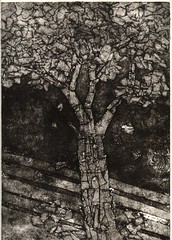 2 of my recent batch of collograph prints from class(2) Not everyone has what it takes to be one.
2 of my recent batch of collograph prints from class(2) Not everyone has what it takes to be one.A couple of days ago I read an old complaint about digital photography(kind of ironic, given that it's
Wired magazine). So what if all these digital tools has allowed everyone to create a photographic or graphic image or a video,
it's still not art - the writer insists.
So what does it really take? What defines that sacred circle where, even if you
feel like an artist, you are not entitled to step into.
Two weeks ago, having messed up a
collograph print, I looked at it and told N that maybe I would scan it and digitally work in new layers to the image, including a text overlay. She suggested instead that I could create a stencil template using gesso for the text, and print it on. She described the entire process which, to me, sounded way too complex.
"Wah, that's way too much work!"
"Well," N smiled, "that's art."
I've been thinking. Yes, that's why N is an artist, and I am not. But perhaps that's also why we all want to feel like an artist - to feel, even if it is for a day, that we must pursue this one thing to perfection regardless of what it takes. Better still, that we have it in us, that in fact it is ours alone, to accomplish it.
